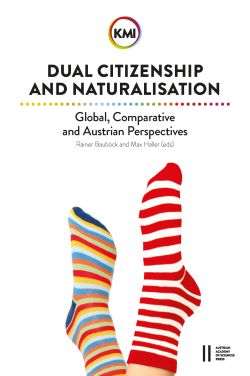Rainer BAUBÖCK - Max HALLER (Hg.)
Dual Citizenship and Naturalisation
Global, Comparative and Austrian Perspectives
Peter J. Spiro
S. 81 - 96
Verlag der Österreichischen Akademie der Wissenschaften
doi:
10.1553/978OEAW87752_Chapt04
Abstract:
Dual citizenship was once the bane of states and individuals. Today, a clear majority of states accept the status and it has become commonplace. The shift reflects changes in the nature not only of national identity but also of the individual’s relationship to the state and to the world. States have almost no remaining incentive to police dual citizenship at the same time that individuals often have incentives, sometimes substantial ones, to secure it. This chapter first recounts how dual citizenship came to be normalised. It then considers how the COVID pandemic might impact on dual-citizenship opportunity structures. Although COVID may diminish the instrumental value of dual citizenship for purposes of third-country mobility privileges, it highlights the core benefit of admission rights into the country of additional nationality. Dual citizenship now becomes a kind of global health insurance as well as a way to protect mobility rights, even for those already holding premium passports. For transnational elites, these newly surfaced advantages will magnify incentives to secure investment citizenship. Others will be motivated to avail themselves of ancestral and other forms of strategic citizenship. States, meanwhile, are unlikely to see serious new costs to pre-COVID citizenship practices. Demand for dual citizenship is thus likely to rise while remaining broadly available.
2021/05/05 12:16:35
Object Identifier:
0xc1aa5576 0x003c6ff6
Rights:All rights reserved.For questions regarding copyright and copies please contact us by email.
The toleration of dual citizenship has become a global trend as states try to retain ties to their emigrants or to encourage their immigrants to naturalise. This volume examines changes in state attitudes to dual citizenship and their social impact, zooming in from analyses of global dynamics to a series of country case studies that illustrate the variety of reasons and intentions behind dual citizenship reform. Finally, five chapters provide the most thorough analysis of the special Austrian case so far. They show the size of Austria’s untapped potential for naturalisation of immigrants, the incoherence of its citizenship policies at home and abroad and the need for a comprehensive reform.
…
Die Duldung der doppelten Staatsbürgerschaft ist zu einem globalen Trend geworden, weil Staaten versuchen, die Bindung zu ihren Auswanderern aufrechtzuerhalten oder ihre Einwanderer zur Einbürgerung zu ermutigen. Dieser Band untersucht diese Änderungen der staatlichen Haltung und ihre sozialen Auswirkungen. Er beginnt mit Analysen der globalen Dynamik und fokussiert anschließend auf Länderfallstudien, die die verschiedenen Gründe und Absichten hinter Reformen der Doppelstaatsbürgerschaft veranschaulichen. Abschließend bieten fünf Kapitel die bislang gründlichste Analyse des österreichischen Sonderfalls. Sie zeigen die Größe des ungenutzten Einbürgerungspotenzials in Österreich, die Inkohärenz seiner Staatsbürgerschaftspolitik gegenüber Ein- und Auswanderern und die Notwendigkeit einer umfassenden Reform.




 Home
Home Print
Print
 References
References
 Share
Share
